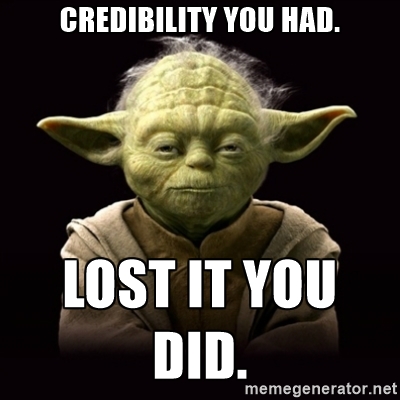 Read any number of books on leadership and you are guaranteed to run into a segment discussing the importance of leadership credibility. There are a number of ways suggested that the leader attain credibility in the eyes of his or her subordinates. That credibility is crucial in gaining more than just compliance from your subordinates. Unfortunately, there is no iron-clad way to do that; it is hard to influence how others see you. However, with some persistence and by holding true to your personal values, you’ll be well on your way.
Read any number of books on leadership and you are guaranteed to run into a segment discussing the importance of leadership credibility. There are a number of ways suggested that the leader attain credibility in the eyes of his or her subordinates. That credibility is crucial in gaining more than just compliance from your subordinates. Unfortunately, there is no iron-clad way to do that; it is hard to influence how others see you. However, with some persistence and by holding true to your personal values, you’ll be well on your way.
You can control your actions in the leader-to-subordinate relationship–you can’t tell them how they should see you. By applying personal values to your everyday actions, often times you build a reputation—a characteristic or general perception that others know you by. Hopefully, you build it on a positive and moral reputation stemming from personal values—building it on a bad attitude or a trivial pet peeve often repels others. As my MTI from basic training said, “A first impression is a lasting impression.”
Building a reputation starts early. As a young NCO, I was often seen as being someone who was meticulous and thorough, by-the-book; any task I did was unquestionably done correctly—it was all a matter of integrity. I would get a pat on the back from some people who were appreciative of my work ethic. Some of my senior leaders would defend my work when it was called into question. This reputation reflected on me in a few ways. In one light, I was seen as someone who would get the job done right. In another light, I was viewed as someone who worked slowly. However, anyone who knew me knew that when I signed my name to a job, they could count on it being correct and it was highly unlikely that one would find anything wrong after they inspected my work.
That kind of stuff tends to compound on itself. That reputation and my adherence to my values morphed into a sense of higher responsibility as I was entrusted to do more. I would train, monitor, and correct my subordinates. I made clear what I expected from them, even more so to my direct reports. If I was ranking on a job, people knew it without my having to throw around rank. I made it my duty to ensure the people on my shift were squared away. Once I was promoted, I was moved into higher positions based on my work ethic and reputation. You hear about ‘power bases’ through PME or other leadership courses—knowledge is one of those. I used that to a great extent; it often became the thing I was known for, and it had stemmed from my meticulous ways as a by-product. I was sought out by my subordinates for a variety of issues. Hence, I had built credibility. People knew what I had done, my work ethic, and my knowledge level.
On the other side of this discussion, one has to recognize that leaders can lose credibility very easily. Once lost, it is hard to regain. This is where it pays to be humble—admitting your mistakes to your subordinates doesn’t equate to weakness or ‘blood in the water’. You will have to work hard to regain it. If you have to force or fake something to be perceived as a leader with credibility, it’s easier to lose your footing and fall into that trap.
You have to use the values that come to you naturally or your efforts will be seen largely as disingenuous. If you are someone that values innovation and creativity, be someone that tries to make things better. In aircraft maintenance, that could be as simple as submitting technical data changes to make tasks easier or more efficient. Ask the abstract questions during those times when senior leaders field questions to the audience. Jump on board to a process improvement event and be the person explaining how a process could be done better and the way forward to get there. Be the guy that brings up problems but also proposes innovative solutions in the same breath.
As an example, if you are inclined to be innovative and creative, think of yourself as ‘visionary’–a ‘large scale’ version of someone who is creative and innovative. As your scope of responsibility and control grows, so does your capability and the effect your values have on the organization as a whole. As members of an organization, you often feel that effect through policies or the shifting of priorities–the result of the values or proclivities of those senior leaders. If you are that visionary senior leader, it is likely you would have a vision to stir up creative solutions or innovative processes; you would likely be inclined to move more in that direction than toward mechanical standardization efforts. Your priorities would affect people, how they operate, and how your organization functions. Make your values into a positive reputation, build that credibility, and impact others.

